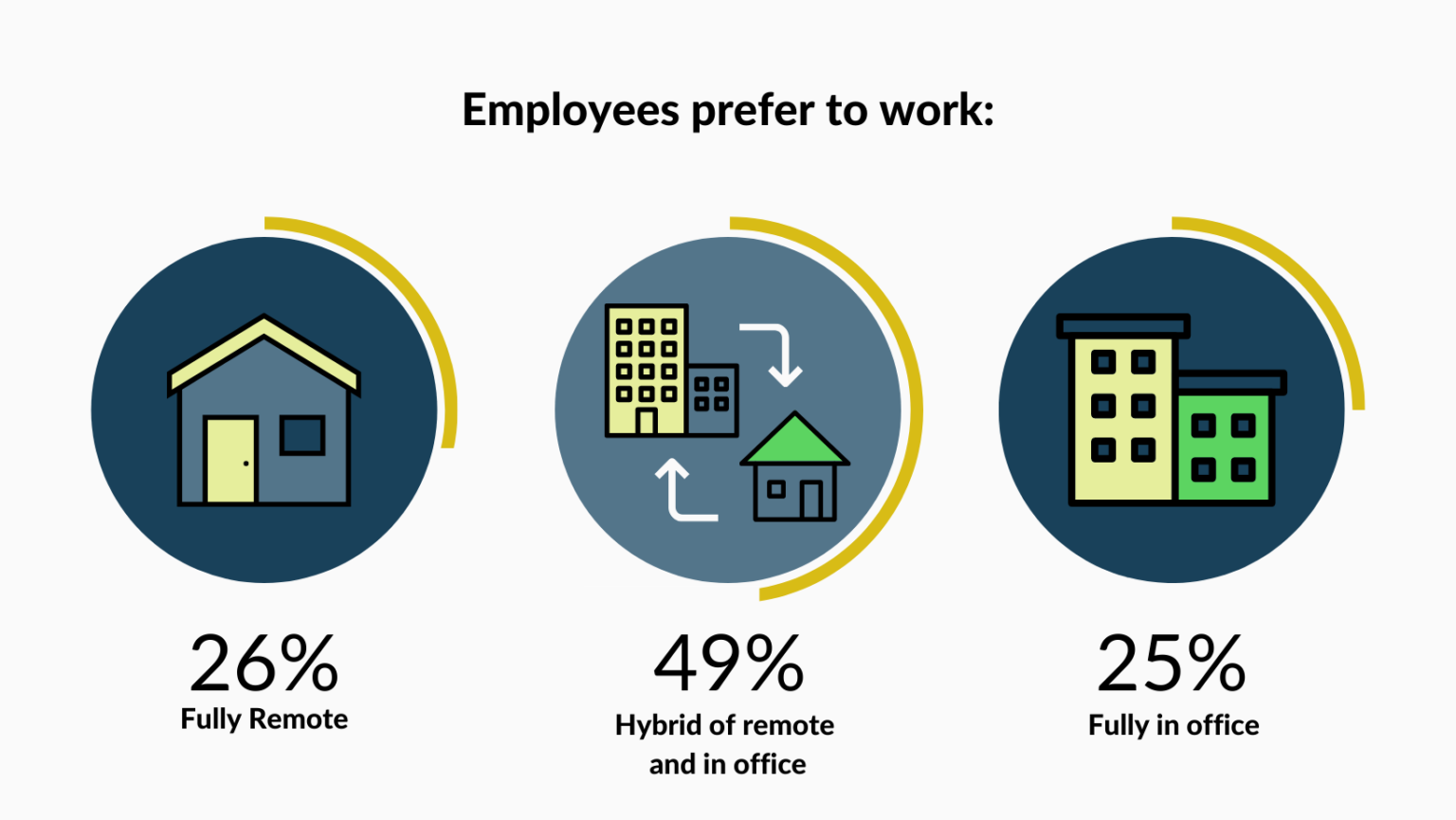Career Tips
Pros And Cons: Working From Home Vs The Office

Most professionals can now work from home due to modern technologies and a global epidemic. After the 2020 COVID-19 pandemic, several companies offered workers the opportunity to work from home or return to the office on a permanent or hybrid basis. Employee flexibility surprised many. Hybrid—a blend of remote and in-office—is the most popular option among employees, according to research.
In a Robert Half poll of over 1,000 workers, 49% preferred a hybrid employment, half remote and half in the office.

Now let’s fast forward to 2023. While initially, the idea of a 20-step commute sounded idyllic, for many, the challenges of working remotely full-time have become all too real. Remote circumstances introduced increased stress, technological issues and studies report a negative a wear on mental and emotional health.
Of course, heading back to work at the office also presents a source of stress and significant readjustment. When faced with the choice, it can be useful for employees and employers alike to weigh the pros and cons of working from home vs. office. This consideration should begin with an assessment of office space needs.
Assessing Your Office Space Needs
Coronavirus reshaped work. 26% of Americans worked from home in 2022, down from 71% in 2020.
Post-pandemic, remote and full-time work-from-home jobs are here to stay. As their business demands, goals, and difficulties evolve, owners and operators realize they need more flexibility. Thus, their workplace must change.
New protocols must include business owners’ beliefs and priorities. Employees must also consider their office needs. Internet, headset, and webcam aren’t enough. Understand your priorities to decide if remote or in-office work is suitable for you.
What are Your Priorities?
When it comes to working from home vs. working in an office, there are benefits and drawbacks. We’ll shed more light on those pros and cons in a moment, but to set context for your own needs, it’s important to engage in some reflection:
- How happy are you either at home or at work?
- How much does a commute take out of you each day?
- Do you miss the networking opportunities you had in the office?
- Do you feel distracted at home?
If you can work from home or in an office, you must first decide what’s most important to you. Your life or productivity may be affected. Some people can achieve a better work-life balance by working from home, but others need to keep work and home life distinct. This is deeply personal. Knowing whether to change is crucial if the choice is before you.
Employers and employees should consider the pros and cons of each arrangement.
Pros and Cons of Working From Home
Once you know your priorities, it’s far easier to see the relative value of every pro and con of working from home. What started as a response a pandemic has grasped a permanent spot in work set-ups, and there is now plenty of insight into both the good and the bad that come with it.
Pros of Working from Home
Here are some pros to working from home.
Save on Time
Having no commute is a huge advantage to working from home, and definitely supports the priority of spending more time with family or engaging in activities that support mental health and wellness. For some people, losing the commute has literally restored 2-3 hours of time to their day, which they are free to do with what they wish.
Independence
While there may be meetings you have to video conference in for, and you may be expected to work 9-5, there is usually some independence in when you do tasks and maybe some flexibility in how you do them. This can give some power back to you as an individual, enabling you to organize your day with greater autonomy.
Cost Savings
Food budgets, travel budgets and even the environment get a boom from work from home arrangements. The difference in cost between eating out and eating at home is noteworthy, and can add up over time. Not driving into work everyday is a huge source of cost savings. Fewer cars on the road translates into less spent on gasoline and maintenance.
Flexibility
When schools closed nationwide, working parents had to figure out what to do with their kids. Splitting shifts with another parent or asking family and friends for help was common. Many working parents now enjoy seeing their kids more or being there for important events. Working from home allows for drop-off, soccer practice, and other family activities.
Cons of Working from Home
Here are some cons to working from home.
No Structure
For some people, a cup of coffee and the paper, the drive in and being “on the clock” during working hours is a desirable way to live life. This kind of routine is utterly lacking in work from home environments, which can create a kind of external and internal chaos. Working in an office provides structure that virtual work simply cannot.
Feeling Disconnected
In general, it is possible to become disconnected from your place of work when you are only working remotely. Loneliness, minimized networking capacity, poor team communication and more are contributing factors to this.
Overworking
Many work-from-home employees work more than they would in an office. Many workers work weekends and work more hours from home than in the office. When work and home blur, “logging off” might be difficult.
Mental Health
Employee wellbeing is a key factor that employers must consider when they are enacting workplace and work arrangement policies. There is some significant evidence to suggest that long-term work from home arrangements are not always in the best interest of the mental health of an employee.
Pros of Working from an Office
Here are some pros to heading back to the office.
Better Time Management
Offices have structure, unlike work from home. A set routine, desk, and workstation can help the transition and satisfy a desire for order. Working from home, time seems unlimited. The office enforces and standardizes deadlines and expectations, which can boost productivity.
Networking Opportunities
There is power in numbers, and that power isn’t just about collective decision-making: creativity thrives in collaboration. This has been hard, and sometimes impossible, to match through virtual meetings. Working in an office restores people’s ability to make meaningful connections that result in innovation.
Data on remote worker productivity was conflicting for a while. Employees must know themselves while making priority decisions: working from home is distracting and difficult for many. Returning to work reduces self-discipline and provides ready-made structures for to-do lists.
Cons of Working from an Office
Here are some cons to heading back to the office
Inflexible
The timing of everything in a typical day will shift ever-so-slightly when you go into the office each day. Coffee breaks, lunch breaks, meetings and even task pacing may not be up to you in the same way, or at all. This inflexibility can be a deterrent for some people who are being asked to work in office full time.
Back to the Commute
“The grind,” for many people, includes a daily commute to work. Whether by car, carpool, train or bus, losing the time of a commute can cut into prioritized family commitments, hobbies, sports and more. This can feel like a loss, especially if your priorities have supported your overall wellbeing.
Exposure to Illness
Employers are taking this seriously. New workplace health and safety requirements go beyond sanitization and regular cleaning. By dedensifying workspaces and boosting wellness standards, business owners are rethinking office architecture. Employers’ strategic actions and investments to protect their employees reduce the risk of all sickness types.
Other Considerations for Home Based or In-Office Work
To be productive, employees need to thrive. As you consider working from home vs. office, there are numerous factors that will impact your ability to do well in either context:
- How is your overall well-being currently?
- How self-driven are you?
- How much does socialization impact your daily life and creativity?
- What portion of work would you miss in either context?
- What would you gain in either context?
More and more, employers are tuning into what their employees need and making provisions that support employee health and wellness.
In Conclusion
Home vs. office employment has pros and cons. Work has changed post-pandemic. Companies provide many in-office, hybrid, and remote work choices. Consider the benefits and cons before choosing to work from home or in an office.






















